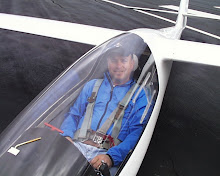
"Into Thin Air" by Jon Krakauer is about the people who died on a 1996 Mt. Everest climbing expedition. There have been times in the past where I thought it would be cool to climb mountains. Mind you, I was never serious about it, but the thought did seem appealing. I have two cousins that are avid climbers. One of them has climbed Mt. Aconcagua in South America, the highest mountain outside the Himalaya's and Mt. Kilimanjaro in Africa. He had hoped to be on an Everest team in 2000 but I lost track of him.
What I read in the book bothered me. I saw the futility of mountain climbing. While it is amazing to think about the physical abilities of climbers and their capacity to endure pain, it is futile because in order to conquer the odds there has to be many years of sacrifice. What is sacrificed is family.
In the IMAX movie "Everest", there is an extended interview with Beck Weathers, a client of Rob Hall. Weathers nearly died on Everest in 1996. He wrote a book called "Left For Dead", (the next book on my list). In his interview he said, "...when you're dying you don't think about your work or the next house you want. You think about those you hold close in your heart."
Rob Hall, one of the Everest guides who died, was chronicled in the book. Hall said that any reasonably fit person could summit Everest. I believe this brash statement spawned a generation of "peak baggers". If you have money, you can bag a peak. In 1996 dollars it would cost about $60,000 to have Rob Hall guide you for an attempt on Everest. Then you have to provide your own transportation, clothing and conditioning. In a blog about one of the climbers in the 1996 disaster one person writes "[Sandy] Pittman epitomizes for me the ignoble decline of Everest into what it is now - a meaningless symbol of what money can buy you in this world."
It was also noted in the book about some Japanese climbers who passed by two other climbers from India who were dying. In their words they said you can't have morals above 25,000 feet. This is against the grain of everything I've been taught. Had the Good Samaritan been on Everest I believe he would have stopped to help others. Had I been there and not stopped, well, it probably would have haunted me the rest of my days.
Mountain climbing is best left for those who have the ability yet at the same time have no family ties. But the conscious decision to either abandon family or to serve only yourself by not having a family of your own is without merit. Thus the futility remains. Climbing appears to be some peoples attempt to find some version of inner peace. Little do they know that peace is not found at a summit of some lofty and distant mountain, but from God.
What I read in the book bothered me. I saw the futility of mountain climbing. While it is amazing to think about the physical abilities of climbers and their capacity to endure pain, it is futile because in order to conquer the odds there has to be many years of sacrifice. What is sacrificed is family.
In the IMAX movie "Everest", there is an extended interview with Beck Weathers, a client of Rob Hall. Weathers nearly died on Everest in 1996. He wrote a book called "Left For Dead", (the next book on my list). In his interview he said, "...when you're dying you don't think about your work or the next house you want. You think about those you hold close in your heart."
Rob Hall, one of the Everest guides who died, was chronicled in the book. Hall said that any reasonably fit person could summit Everest. I believe this brash statement spawned a generation of "peak baggers". If you have money, you can bag a peak. In 1996 dollars it would cost about $60,000 to have Rob Hall guide you for an attempt on Everest. Then you have to provide your own transportation, clothing and conditioning. In a blog about one of the climbers in the 1996 disaster one person writes "[Sandy] Pittman epitomizes for me the ignoble decline of Everest into what it is now - a meaningless symbol of what money can buy you in this world."
It was also noted in the book about some Japanese climbers who passed by two other climbers from India who were dying. In their words they said you can't have morals above 25,000 feet. This is against the grain of everything I've been taught. Had the Good Samaritan been on Everest I believe he would have stopped to help others. Had I been there and not stopped, well, it probably would have haunted me the rest of my days.
Mountain climbing is best left for those who have the ability yet at the same time have no family ties. But the conscious decision to either abandon family or to serve only yourself by not having a family of your own is without merit. Thus the futility remains. Climbing appears to be some peoples attempt to find some version of inner peace. Little do they know that peace is not found at a summit of some lofty and distant mountain, but from God.





1 comment:
Dad that sounds like a very sad book. I don't think I could ever read it. I read "The Long Road Home" while Joel was in Iraq. Not a good idea! I've sworn off all sad stories now.
Post a Comment